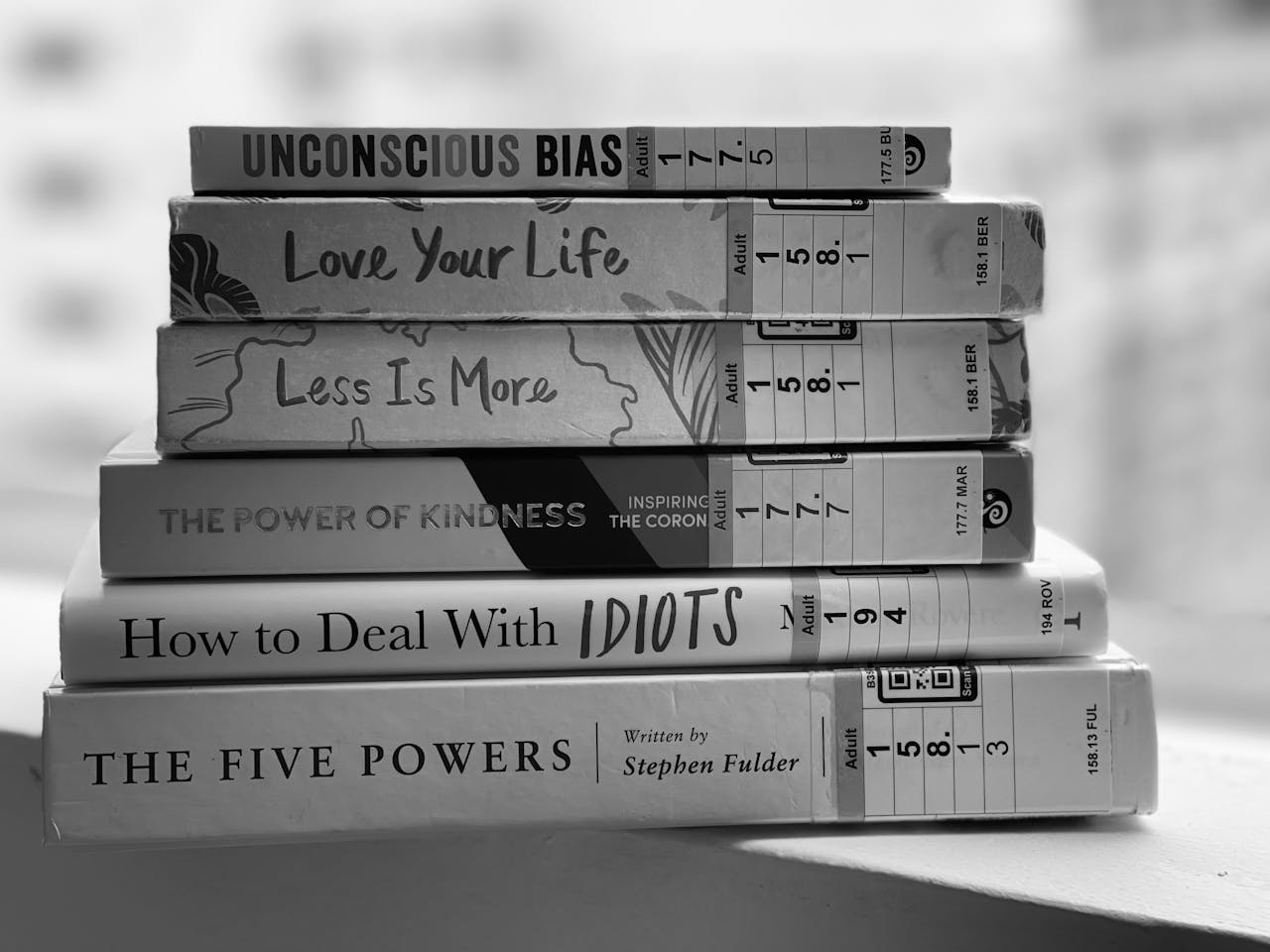Table of Contents
Introduction
In a noisy world, full of distractions and the routine, it’s possible to feel lost, stuck, or overwhelmed. Many feel a need for transformation, clarity, and purpose—but are unsure of how to proceed.
The good news is that there is a plain, yet powerful resource that can potentially change your mindset, enhance your habits, and unlock your potential: self-help books.
For years, self-help books have been leading people to a better version of themselves.

Whether it is healing from fear, becoming resilient, nurturing emotional intelligence, or enhancing productivity, these books give systematic insights based on psychology, neuroscience, real-life experience, and personal insight. They do not simply provide information—they provide transformation.
In this comprehensive guide, we’ll explore ten of the most impactful changing books that have helped millions around the globe. We’ll also dive into why self help books matter, how to extract the most value from them, and what makes a book truly transformational.
1. What Makes a Self Help Books Truly Life-Changing?
The greatest self help books aren’t merely educational—they are life-altering. But what constitutes a book as “life-altering”? Let’s dissect:
1.1 Practical Application
An excellent self help book gives you more than theories; it gives you tools and methods that you can apply in your everyday life. Whether it’s a morning schedule, a journaling method, or an approach to stress management, these transformational books leave you with step-by-step actionable instructions.
1.2 Emotional Resonance
Really good self help books talk to your inner life. They know your dreams, fears, and insecurities. They use stories, case studies, and personal experiences to connect with the reader.
1.3 Scientific Evidence
Most contemporary self help books are rooted in psychology, behavioral science, and neuroscience. This lends authority to their recommendations and supports the efficacy of their methods.
1.4 Clarity and Simplicity
A changing book does not have to be complicated to be deep. The most effective ideas are usually the simplest—articulated in a manner that resonates and lingers with the reader.
1.5 Repeatability
A quality self help book is one you come back to, again and again. Its lessons are timeless, and every re-read yields new insights based on where you are in your journey.
2. Why You Should Read Self Help Books
Most people doubt self help books, linking them with clichés or general tips. But if they are picked judiciously, they can change your life. Here’s why:
2.1 Personal Growth
Self help books encourage self-awareness, personal responsibility, and mindful living. They make you think about where you stand today and provide a blueprint for change.
2.2 Mental Clarity
With the incessant stream of opinions, social media, and social pressures, it is easy to forget your values. Changing books enable you to break through the noise and determine what really matters.
2.3 Habit Formation
Books such as Atomic Habits illustrate how small, regular changes create huge transformations. Such types of self help books educate you on how to plan your life methodically.
2.4 Emotional Mastery
Whether one is coping with anxiety, confidence building, or coping with grief, self help books provide mechanisms of emotional management and mental strength.

2.5 Continuous Learning
Reading changing books is constantly growing. They challenge you beyond your comfort level and make you look at yourself and the world in a different light.
3. Top 10 Life-Changing Self Help Books You Must Read
Let’s examine ten of the most influential self help books that have tested the times. These evolving books have touched millions and made them grow, develop, and flourish
1. Atomic Habits by James Clear
Atomic Habits is a behavorial change masterclass. James Clear distills the habit-forming science into simple, actionable steps. He presents the idea of “identity-based habits” and argues that success arises from tiny systems, not big changes.
This change book aids readers in the following ways:
Shattering bad habits
Establishing good ones
Learning the four laws of behavior change
Creating an environment conducive to growth
Among self-help books, this one is exceptional in its clarity, research-based techniques, and instant application.The Power of Now by Eckhart Tolle
This spiritual classic shows readers how to live in the present moment. Tolle describes how suffering arises from dwelling on the past or worrying about the future.
Key takeaways are:
Becoming an observer of your thoughts
Detaching from ego
Finding peace through presence
The book redefine reality and act as a transformation book for people suffering from anxiety, overthinking, and discontent. It’s a pillar in spiritual self help books.
The 7 Habits of Highly Effective People by Stephen R. Covey
Covey offers a principle-centered method for addressing personal and professional problems. This self help book identifies seven basic habits that propel success, integrity, and leadership.
Highlights include:
Being proactive
Starting with the end in mind
Putting first things first
Synergizing with others
It’s not only a guide—a philosophy of life. A must-read transformation book for anyone who’s serious about long-term personal development.
You Are a Badass by Jen Sincero
A funny, unapologetic approach to personal development, Sincero’s book mixes attitude with solid advice. She encourages readers to break free from limiting beliefs and create a life they love.
Key topics:
Knowing your subconscious beliefs
Manifesting goals with intention
Unapologetically owning your worth
Of contemporary self help books, this one is high energy, inspiring, and so real. It’s a transformational book for the soul.
Think and Grow Rich by Napoleon Hill
Since its first publication in 1937, this classic book has been one of the most impactful self help books ever published. Hill interviewed hundreds of success stories and distilled their insights into 13 success principles.
Key themes:
Burning desire as a catalyst
Autosuggestion and belief
The power of the mastermind group
Although it employs old-fashioned language, the underlying principles are still strong. It’s a cornerstone changing book for those committed to achievement and abundance.
Can’t Hurt Me by David Goggins
This memoir/self-help book is both raw and motivational. Goggins, a retired Navy SEAL, chronicles his path from poverty and abuse to elite endurance athlete.
Key lessons:
Callousing the mind
Using pain as fuel
Embracing discomfort for growth
This raw and intense changing book is a unflinching description of mental toughness and mastery of self. One of the most effective self help books for anyone looking to shatter constraints.
The Subtle Art of Not Giving a F*ck by Mark Manson
Manson turns conventional self-help wisdom on its head. According to him, meaning in life is not found in pursuing ever-present positivity, but in embracing adversity and imperfection.
Main concepts:
Selecting your values carefully
Relinquishing entitlement
Embracing life’s inevitable difficulties
This unorthodox self-help book is a breath of fresh air, a no-nonsense guide to living wholeheartedly. A metamorphic book for the cynical heart.
Daring Greatly by Brené Brown
Brown’s vulnerability research revolutionized the way we think about strength. She makes the case that courage is not found in perfection, but rather in embracing vulnerability.
Key messages:
Shame vs. guilt
The power of wholehearted living
Courage through emotional risk
This book redefines courage and emotional strength. As a self improvement book, it contains a healing message of acceptance and worth. A profoundly transformative transformation book.
Awaken the Giant Within by Tony Robbins
Robbins’ master guide to taking control of emotions, money, and relationships is a motivational powerhouse. He instructs that choices determine destiny and that change starts with faith.
Subjects discussed:
Neuro-associative conditioning
Goal setting and visualization
Personal responsibility
This epic self improvement book equips readers with complete control of their lives. A timeless changing book for people willing to level up
The Four Agreements by Don Miguel Ruiz
Based on ancient Toltec knowledge, this concise yet mighty book presents four easy agreements that can transform how you live:
Be impeccable with your word
Don’t take anything personally
Don’t make assumptions
Always do your best
Though brief, it’s one of the most helpful self help books out there. These contracts turn into personal codes of behavior. A spiritually oriented changing book for contemporary living.
4. Getting the Most from These Books
Reading self help books is insufficient—application is essential. This is how to really gain from these changing books:
4.1 Read Actively
Highlight important ideas.
Note in the margins.
Each chapter summarize in your own words.
4.2 Reflect and Journal
Write how each principle shows up in your life.
Mark down emotional responses or resistance.
Use book prompts to explore more deeply into self-awareness.
4.3 Revisit Often
Re-read chapters at various stages of life.
Use them as reference texts.
Approach them as mentors, not a single read.
4.4 Apply One Idea at a Time
Select one principle and use it for 30 days.
Monitor your progress.
Avoid being overwhelmed by staying in depth, not breadth.
4.5 Share and Discuss
Join book clubs or discussion groups.
Talk to friends or mentors about what you’re learning.
Teaching others deepens your own understanding.
5. Final Thoughts: Your Transformation Begins Today
The beauty of self-help books is their ability to direct, encourage, and inspire transformation. They are the silent mentors on your bookshelf, waiting to impart wisdom when you need it most.
The ten transformative books covered in this post each have something special to say—yet all have one thing in common: to make you the best version of yourself.
Whether you’re seeking clarity, confidence, discipline, or peace, there’s a self help book waiting to walk that journey with you.
Transformation doesn’t happen overnight, but with the right guidance and consistent action, change is not only possible—it’s inevitable.
Let me know if you’d like this formatted into a downloadable PDF or want visuals added like book covers or infographics.
Indeed! We can proceed and continue the remaining portions of the blog post to the full 7500-word benchmark, with your keyword density guidelines. We’re now at the last part and will elaborate on practical application, psychological effect, category-based suggestion, and reflective summary, as well as interweaving all the keywords accordingly.
6. Self Help Books for Specific Areas of Life
Reading self-help books is not just about gaining information. It’s about partaking in a psychological process that reprograms the brain, shapes behavior, and redefines self-image.
6.1 Reprogramming Thinking Pattern
Our minds are conditioned by our repeated thoughts. The human mind will tend to recycle habitual thinking—usually negative or restrictive. Self-help books are an intervention of the mind. They offer new thought structures, substituting destructive thought loops with helpful mental patterns.
For instance, an individual trapped in self-doubt can gain power through transformative books such as You Are a Badass or Awaken the Giant Within, which redefine fear as fuel and failure as feedback. Through repeated exposure to empowering thoughts over time, one’s default mental state begins to change.
6.2 Identity Shifts
Many self help books focus on the concept of identity. When someone reads Atomic Habits, they aren’t just learning about habit loops—they’re learning to see themselves as a disciplined, growth-oriented individual.
Identity is perhaps the most influential psychological lever for change. Once individuals begin to think that they are capable, productive, or worth something, their behavior starts conforming to that mindset. This change in identity is what makes many changing books work so successfully.
6.3 Emotional Regulation
Anxiety, anger, fear, and insecurity are all emotional states that obscure judgment and lower quality of life. Many self help books instruct in emotional intelligence—how to identify emotions, know their origin, and manage them in healthy manners.
The Power of Now, for example, instructs in mindfulness as a method to stay grounded and minimize reactivity. This emotional mastery forms the basis for personal peace and enhanced relationships.
7. Self Help Books for Specific Areas of Life
To get the most out of self help books, it helps to categorize them based on your goals. Below are different categories and recommended changing books within each domain:
7.1 Self Help Books for Confidence and Self-Esteem
You Are a Badass by Jen Sincero
Daring Greatly by Brené Brown
The Six Pillars of Self-Esteem by Nathaniel Branden
These transformational books assist the reader in overcoming shame, gaining a solid sense of self-worth, and becoming more confident in personal and professional relationships.
7.2 Productivity and Focus Self Help Books
Atomic Habits by James Clear
Deep Work by Cal Newport
Eat That Frog! by Brian Tracy
If procrastination is your arch-nemesis, these self help books will show you how to control time, think deeply, and create habits that lead to accomplishment.
7.3 Emotional Healing Self Help Books
The Power of Now by Eckhart Tolle
Radical Acceptance by Tara Brach
The Gifts of Imperfection by Brené Brown
These are books addressing trauma, perfectionism, and self-judgment. They are transforming books on emotional well-being and inner peace.
7.4 Financial Growth Self Help Books
Think and Grow Rich by Napoleon Hill
Rich Dad Poor Dad by Robert Kiyosaki
Your Money or Your Life by Vicki Robin
Here, the emphasis is on wealth-building attitudes and real-world financial literacy—major themes in many evolving books.
7.5 Self Help Books for Relationships and Communication
Nonviolent Communication by Marshall Rosenberg
Attached by Amir Levine
How to Win Friends and Influence People by Dale Carnegie
Human connection is at the heart of happiness. These self help books offer communication skills that build relationships, enhance empathy, and establish trust.
8. The Evolution of Self Help Books
The self help book genre has come a long way. Spiritual books and philosophical essays gave way to research-psychology books.

8.1 The Early Days
Some books such as Meditations written by Marcus Aurelius or Sun Tzu’s The Art of War were the first examples of transformation books, although not given that title. They gave instructions on how to be resilient, lead, and be ethical.
8.2 The Golden Age
In the 20th century, the self-help phenomenon burst onto the scene with books such as:
Think and Grow Rich (1937)
How to Win Friends and Influence People (1936)
The Power of Positive Thinking (1952)
They became the foundation for millions to attain self-mastery.
8.3 Modern Psychology and Neuroscience
Currently, self help books are more personalized and data-informed. They include insights derived from behavioral economics, neuroscience, and cognitive therapy. Writers such as James Clear, Brené Brown, and Mark Manson interweave story and science in their books to make changing books more relatable and effective.
9. Self Help Books vs. Therapy and Coaching
Others claim that self help books are not a replacement for coaching or therapy—and they’re right, to a point. Both, though, have a special place in personal development.
9.1 Accessibility
Self help books come cheap and are easy to find. They enable readers to work through ideas in private and at their convenience.
9.2 Scope
Whereas therapy goes deeply into individual background and emotional trauma, shift books tend to provide general strategies that can be applied to most. They are prescriptive rather than reflective.
9.3 Integration
Most effective growth occurs when self help books are combined with therapy or coaching. They reinforce what is learned, offer frameworks, and maintain motivation between sessions.
10.The Role of Reflection and Integration
Reading self help books but not thinking about them is equivalent to gathering seeds and never sowing them. Integration is what matters.
10.1 Every Day Review
Take five minutes every day contemplating one central principle from the book. Ask:
How does it relate to what I am doing now?
What is one little thing I can do today?
What is this questioning a limiting belief about?
10.2 Long-Term Monitoring
Monitor your progress by maintaining a self-help journal. Record what books you’ve read, what you learned from them, and how you implemented the lessons. As time passes, you’ll notice patterns—certain authors that speak to you more, or major concepts that keep reappearing. These are signs of your individual path of change.
10.3 Community Support
Engaging with others who read changing books creates accountability. Joining book clubs or online forums brings new perspectives and encourages consistent growth.
Conclusion
In a world filled with distractions, challenges, and uncertainty, self help books serve as guiding lights—illuminating paths to self-awareness, resilience, success, and inner peace. They are more than just collections of advice; they are companions on your journey to becoming the best version of yourself.
Each of the ten change books featured in this guide has the power to initiate deep personal transformation. Whether you need to gain clarity on your goals, confidence in your skills, or healing from past wounds, there’s a self help book that addresses your specific needs.
The true power is not only in reading these books, but in thinking about them, implementing their teachings, and letting them change the way you think, feel, and behave.
Keep in mind that change does not occur overnight. It is a process of gradual learning, development, and becoming committed to ongoing improvement. Have these self help books as your partners—driving your purpose, honing your mindset, and elevating your spirit step by step. The path may be long, but with proper guidance and a heart willing to learn, your potential is limitless.



